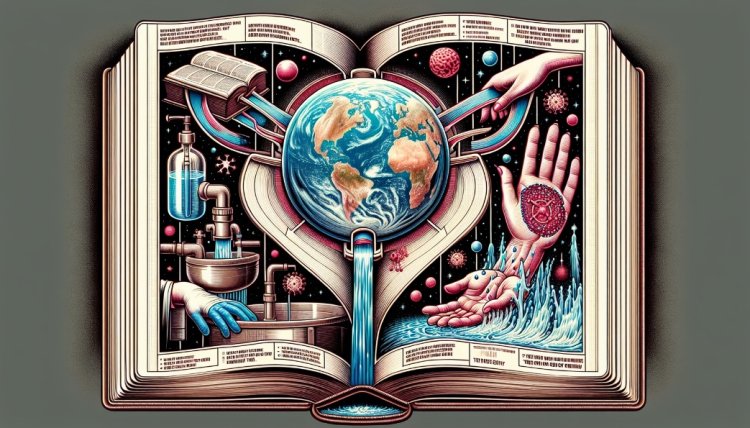The Bible: A Source of Scientific and Medical Knowledge
Can the Bible be a source of scientific and medical knowledge? Dive into the fascinating debate, exploring historical context, diverse interpretations, and the limitations and potential of scripture as a scientific guide.

The Bible: A Source of Scientific and Medical Knowledge
Introduction
The Bible is an important source of historical knowledge and moral advice in society. The fact that the Bible also contains medical and scientific knowledge from thousands of years ago, before mankind made these discoveries, may surprise some people.
One example of this is the idea of the earth floating freely in space, which the Bible alluded to long before scientific knowledge. "He hangs the earth on nothing"," as it says in the book of Job, indicates that God knows where the earth is in the cosmos. Similarly, the quarantine regulations in the Bible indicate that you must wash your hands under running water to prevent the transmission of disease—practices that only became generally accepted much later in the history of medicine.
The nature of blood and its function in the human body are further explained in the Bible. The statement "For the life of the flesh is in the blood" in Leviticus 17:11 was not fully understood until the development of modern medicine. Blood tests today can identify a variety of diseases, demonstrating the accuracy of this biblical knowledge.
These medical and scientific truths from the Bible show their supernatural beginnings and emphasize their application in everyday life. In this blog, we want to explore and discuss these fascinating facets of the Bible to emphasize its value as a medical and scientific knowledge source. Come and explore these fascinating topics with us as we unearth wisdom from the pages of the Bible.
Earth's Floating in Space
Long before there was evidence to support it, the Bible mentioned the idea that the earth could float freely in space. The statement "He hangs the earth on nothing" from the book of Job suggests that God knows where the earth is in the cosmos. The Bible said for thousands of years that the earth hangs on nothing before scientists recognized this fact in 1650.
The authenticity of biblical knowledge was further confirmed when the Encyclopaedia Britannica published this scientific discovery in 1845. This proves the miraculous beginnings of the Bible and its ability to offer scientific discoveries long before their time.
This biblical truth has far-reaching implications. It shows how important the Bible is in our lives and that it is a reliable source of scientific and medical information. It makes us rethink our view of the world and encourages us to read more deeply into the wisdom it contains.
Handwashing and disease control
It has long been known that hand washing is essential for the prevention of disease. An important person in the history of hand washing is the 19th-century Austrian physician Dr. Ignaz Semmelweis. Due to the high mortality rate among women in hospitals, Dr. Semmelweis found that doctors who failed to wash their hands between patients were inadvertently spreading infections. After doctors began washing their hands with soap and water, the mortality rate dropped dramatically, from 30% to 2%.
Biblical instructions given thousands of years ago also emphasize the importance of hand washing. Leviticus 15 emphasizes the importance of washing the body and clothes with running water and gives recommendations for the treatment of various diseases. These guidelines are in line with today's medical practices, which emphasize effective hand washing with soap and running water.
The wisdom and insight found in the Bible are evident when comparing these antiquated methods with today's medical procedures. Amazingly, the value of hand washing was recognized before diseases with tiny organisms existed. Since good hand hygiene is still essential for infection control today, this realization has had a major impact on disease prevention.
People can stop the spread of disease by recognizing the importance of washing their hands frequently and doing so. By washing your hands with soap and water for at least 20 seconds, you can protect your own health and the health of others. This is especially important before eating, after using the toilet, and after coughing or sneezing. The importance of clean hands has long been recognized; it is a simple but effective strategy for preventing illness.
Blood as a Diagnostic Tool
Long before modern medicine made significant advances, the Bible offered insights into the nature of blood and its function in the human body. The statement "For the life of the flesh is in the blood" in Leviticus 17:11 was not fully understood until recently. It is now common knowledge that blood tests can reveal a variety of diseases and ailments, proving the accuracy of this biblical knowledge.
Thanks to our growing understanding of blood tests and their diagnostic potential, medicine has undergone a revolution. Doctors can assess the condition of our kidneys, liver, thyroid, and heart by testing a blood sample. Blood tests can also detect diseases and conditions such as anemia, diabetes, cancer, AIDS, and coronary heart disease. Thanks to early detection and treatment through this diagnostic technique, many lives have been saved.
It is worth noting that the concept of bloodletting, a medieval procedure in which blood was drawn from a sick person, can help restore health. However, this method proved to be harmful and often led to people's deaths. The case of George Washington is a good example of this. Not knowing that sick people needed blood to fight disease, his doctors drew a large amount of blood from him. This ancient custom underlines the importance of the biblical knowledge that "the life of the flesh is in the blood."
The biblical account of the function of blood in the human body emphasizes the supernatural beginnings of the Bible and, at the same time, illustrates its application in daily life. It illustrates that the knowledge of science and medicine contained in the Bible predates today's discoveries. The accuracy of this biblical insight underscores the wisdom found in the Bible and encourages further exploration and study of the Bible's teachings.
The Earth's Shape and Space Exploration
The Bible contains numerous references to space travel and the shape of the earth, long before these ideas became established in science. "It is he who sits above the circle of the earth," says the book of Isaiah, referring to a spherical figure. This concept from the Bible is three centuries older than Aristotle's idea of a round earth.
The fact that the earth floats freely in space is also mentioned in the book of Job, where it says, "He hangs the earth on nothing." This biblical allusion to the earth floating freely in space was written thousands of years before the scientific discovery in 1650. Moreover, Christopher Columbus believed that the Bible inspired him to embark on the expedition that led him to circumnavigate the globe.
The accuracy of the Bible has significant implications for space exploration. It draws attention to the supernatural beginnings of the Bible and its ability to offer scientific discoveries far ahead of their time. The way the Bible interprets the composition and orbit of the Earth challenges our preconceived notions and inspires us to learn more about the mysteries of the cosmos.
The accuracy of the Bible on scientific topics raises the question of where this knowledge comes from. It challenges us to think about the possibility of divine inspiration and the existence of a higher power that influences how people perceive the world. It also shows how relevant the Bible is to our lives today—not only as a spiritual handbook but also as a source of medical and scientific information that can guide and motivate our exploration of the universe.
Oceanography and the Paths of the Sea
The study of the ocean and its processes, or oceanography, has developed considerably over time. Matthew Maury, sometimes referred to as the "father of oceanography"," was one of the pioneers in this field. In the 1800s, Maury made important discoveries about warm and cold continental currents.
Biblical allusions served Maury both as inspiration and as a means of scientific investigation for his discoveries. Psalm 8:8 speaks of "the paths of the sea"," which Maury interpreted as a call to follow these paths. Thanks to his perseverance, he was able to identify the warm and cold continental currents that are crucial for the circulation of the ocean.
The importance of Maury's discoveries for oceanography cannot be overestimated. His discoveries improved our knowledge of ocean currents and their impact on marine life, climate, and shipping. They shaped our understanding of the world's oceans and laid the foundation for further studies on this topic.
Maury's book "The Physical Geography of the Sea" is still used at universities today and is a fundamental work of oceanography. For students and scientists, his in-depth knowledge of ocean currents, tides, and winds is an invaluable resource. The fact that Maury's book is still used today proves its timeless relevance and enduring influence on marine research.
Lightning and electromagnetic radiation
In the field of science, too, the Bible has always been a reliable source of knowledge and information. In the Book of Job, written thousands of years ago, there is a fascinating allusion to lightning and its ability to materialize as language. This biblical insight predates science's understanding of electromagnetic radiation for thousands of years.
British scientist James Clark Maxwell first discovered the connection between electricity and light waves in 1864, theorizing that electromagnetic radiation is one and the same substance existing in two different forms. This groundbreaking discovery fundamentally changed our understanding of light and its relationship to electricity.
The speed of electromagnetic radiation is what makes it so significant. It travels at around 299,792,458 meters per second, i.e., at the speed of light. This incredible speed, which enables instant communication over long distances, is what makes the internet and other technologies, such as wireless communication, possible.
The scientific understanding of electromagnetic radiation coincides with the biblical mention of lightning and its power to appear in speech. This ancient wisdom foresaw modern advances in communication technology. It is a testament to the knowledge found in the Bible and its application to modern life.
The impact of this biblical information on communication technology cannot be overstated. It has paved the way for the development of numerous devices that depend on electromagnetic radiation, including cell phones, televisions, and radios. The way we connect and communicate with each other has been completely transformed by these developments, which have made the world smaller and more connected.
Nature's Completeness and Finished Creation
According to the Bible, creation, and nature are finished. "So the heavens and the earth and all their host were completed," says Genesis 2:1. The Bible teaches that God created and completed everything in nature, including the planet, the animals, and the exquisite fragrance and beauty of the roses. There is no mention of continuous development or steady progression.
The intricate relationships and balance found in nature also support the notion of completion and perfection. Every element of nature is designed to coexist peacefully, from the intricate food chains that support ecosystems to the delicate interplay between pollinators and flowers. If nature were incomplete or constantly changing, there would be no way to maintain this balance and interdependence.
If nature is complete and does not evolve, there are serious consequences. This means that God created every living thing on earth and every natural phenomenon on purpose. Every component of nature has a purpose and design that reflects the wisdom and greatness of its creator.
I marvel and am in awe when I contemplate God's glory and purpose in creation. The idea that a benevolent and wise Creator intentionally created the complexity and intricacies of nature encourages us to appreciate it. As a reflection of God's creation, it also reminds us of our duty to protect and care for the natural environment.
Noah's Ark and Ship Design
The biblical account of Noah's Ark has long captivated people of many different faiths. It narrates the tale of a massive ship that Noah constructed to withstand a disastrous deluge that God sent. Even though the tale is sometimes read as a religious parable, it also offers insightful information on the planning and building of ships.
Biblical dimensions of Noah's Ark and its alignment with modern ship design
The Bible states that Noah's Ark measured 300 cubits in length, 50 cubits in width, and 30 cubits in height. These measurements generally translate to 450 feet in length, 75 feet in width, and 45 feet in height. It's interesting to note that these dimensions follow current ship design guidelines. For maximum performance and stability, similar length-to-breadth ratios are used in the construction of many modern ships.
Comparison of hull shapes and performance
The Bible does not specifically define the shape of Noah's Ark, but its measurements point to a long, rectangular hull. Because of the hull's well-known ability to create buoyancy and stability in the water, the ship can handle strong winds and large loads. When building vessels for a variety of uses, modern ship designers also take hydrodynamic performance and hull shape into account.
Relevance of the biblical model in shipbuilding
Even though it is an old tale, shipbuilding can benefit from the biblical model of Noah's Ark. Its emphasis on proportionality, buoyancy, and stability is in line with the guidelines that contemporary ship designers follow. Even though materials and technology have come a long way since the time of the Bible, the fundamental ideas of ship design have not changed.
Recognition of the biblical wisdom in ship design
We may appreciate the wisdom and expertise of previous civilizations by acknowledging biblical principles in ship design. The tale of Noah's Ark shows that people were still able to construct seaworthy boats that could resist natural disasters in the absence of contemporary science and technology. This honor bears witness to the extraordinary creativity and knowledge of our forefathers.
Quarantine and Disease Control
The Bible shows its wisdom in disease control by offering helpful guidelines for quarantining contagious diseases. The Book of Leviticus, written more than 3,000 years ago, provides instructions for treating disease and emphasizes the importance of bathing and cleansing under running water. These behaviors are in line with current medical advice, which emphasizes the importance of good cleanliness to prevent the spread of disease.
Amazingly, the Bible recognized the importance of isolation long before modern medicine. Millions of people have died because they violated quarantine laws, such as during the terrible Black Death in the 14th century. Numerous lives could have been saved if people had followed the quarantine laws of the Bible.
The importance of quarantine in preventing disease cannot be overstated. It is possible to stop the spread of disease and protect both people and society by isolating those with contagious diseases. Throughout history, quarantine regulations have been important to control and contain the spread of disease.
The Bible's awareness of the value of hand washing demonstrates its wisdom in disease prevention. The book of Leviticus emphasizes that people and clothing must be washed under running water. These guidelines are consistent with today's medical practices, which emphasize washing hands with soap and running water. It has been proven that proper hand washing is a simple but effective means of disease control and prevents the transmission of infectious diseases.
The biblical guidelines on hand washing and quarantine show how applicable the Bible is to modern life. Eons before the development of modern medicine, the Bible offered valuable lessons on disease prevention that are still valid today. The insight into disease prevention underscores the Bible's miraculous beginnings and encourages us to examine and analyze its teachings more closely.
The Extinction of Dinosaurs and Behemoth
In the Book of Job, God describes a monster named Behemoth. Although its exact name is not known, some believe that it could be a description of a dinosaur. The largest animal known to science, the behemoth, is said to feed only on plants and have a tail that resembles a cedar tree. It is said to have lived in the forests, drank a lot of water without worrying about torrential rivers disturbing it, and its bones were as strong as brass.
There are strong parallels between these features and what we know about dinosaurs. Several dinosaur species were not only the largest animals of their time but also fed exclusively on plants. Thanks to their exceptionally strong bones and long tails, many dinosaurs were able to maintain their huge bodies. It is also believed that dinosaurs needed a lot of water to exist and that they lived in forests.
Science is still speculating about the extinction of the dinosaurs. Although there are several hypotheses, it is worth considering the biblical insight that "He who made [Behemoth] can bring his sword near to him." This implies that God may have been involved in the extinction of these species.
The Bible sheds light on extinct animals like Behemoth, but it does not offer a conclusive explanation for the extinction of the dinosaurs. The account of Behemoth fits with what we know about dinosaurs today and shows how accurately the Bible describes these prehistoric animals. We can appreciate the wisdom and relevance of the Bible to our modern lives by recognizing its observations about extinct animals.
Conclusion
To summarise, the scientific and medical revelations in the Bible are astounding and deserve careful scrutiny. Ideas such as the earth floating in space, the importance of hand washing and isolation, the function of blood in the human body, and even descriptions of dinosaur-like creatures are contained in the Bible. The fact that these discoveries were recorded thousands of years before their scientific discovery emphasizes the supernatural origin and veracity of the Bible.
These truths should be considered, as they challenge our worldview and encourage us to study the knowledge found in the Bible. The scientific and medical expertise found in the Bible demonstrates its applicability in today's world, not only as a spiritual manual but also as a reliable source of knowledge and wisdom.
When we talk about the scientific and medical truths in the Bible, it is important to address skepticism and concerns. It's important to remember that the Bible has been proven true in numerous other areas of history, archaeology, and prophecy, even though some people may disagree or doubt these facts. If you take the time to read, study, and understand the Bible thoroughly, you can better understand and appreciate its teachings.
The Bible contains amazing information about science, medicine, and the natural world, as well as our place in it. These facts, ranging from the location of the earth in space to the importance of blood tests and hand washing, show the wisdom and applicability of the Bible. We can learn even more about the Bible's scientific and medical teachings as we investigate and study them further.



 admin
admin 










